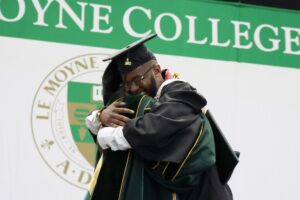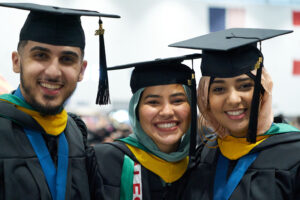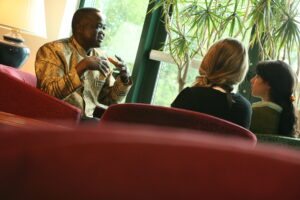Why a Core Curriculum?

Le Moyne’s Secret Sauce: A Universal Academic Experience.
Every Le Moyne student experiences our core curriculum, which simultaneously supports your major and also exposes you to classes outside your major. This approach to learning will give you the tools to understand complex problems and create meaningful change in the world.
The Curriculum at the Core of Every Major
As a Le Moyne student, you’ll share one thing with all of your peers regardless of major: your core classes.
From Transition to Transformation: The Core & Your Program of Study
Our Core includes a first-year seminar and a senior capstone. These two courses bookend your college experience. To begin, you'll take part in an exciting, intellectually challenging seminar to begin your college experience. Then, we will help you tie everything together during your senior year in your senior capstone.
COR 100: Transitions
Your first-year seminar introduces you to life at the college level while also building your understanding of a Jesuit liberal arts education. You'll hear from faculty members who share their interests and challenge you in new ways in the classroom. Many first-year seminars include field trips that deepen your learning and build relationships with your classmates and professors – a key part of the Core seminar.
COR 400: Transformations
In your senior year, you'll put together the knowledge and self-understanding you developed at Le Moyne and apply it to the world beyond the Heights. You’ll focus on social, scientific, artistic and technological ways of understanding the world. You will prepare to collaborate, think about different perspectives, and impact the world around you.
Core Courses & Requirements
In addition to the bookend courses, you’ll take a core writing sequence, specific disciplinary courses, interdisciplinary courses and culture courses.
Transfer Students & the Core
Transfer students are also required to complete the core curriculum to ensure the integrity of a Le Moyne education while acknowledging the importance of flexibility when transferring credits from other institutions.


A Pillar of Jesuit Education
The Core is central to our Catholic and Jesuit mission of educating you in a rigorous academic environment.
The Core Will Help You Stand Out
Whether you’re applying to grad school or looking for jobs after graduation, the experience of your core classes will give you a perspective on the world and on yourself that’s unique to a Le Moyne grad.
- It helps you think critically, explore new ideas, evaluate information and understand how you’ll make a difference in the world.
- You get exposure to the arts, humanities, natural sciences, and social sciences.
- You’ll know how to evaluate issues, ideas and events before making informed conclusions.
- You’ll have exceptional writing, speaking and listening skills.
- The Core helps you build your reasoning and analytical skills as you interpret information online. You’ll evaluate the credibility of the information you encounter.
But the biggest impact from your study of the Core will be the type of person you become. You’ll be ready to make reasoned, ethical decisions by thinking about your values. You’ll recognize different perspectives and thoughtfully analyze ethical and moral dilemmas. You’ll explore cultural and social diversity. And you’ll understand your role in developing just solutions.
My time on The Heights helped me become a sharper critical thinker, which is critical in a field like science that calls for precision, repetition and a healthy level of skepticism. The Core inspired me to become a lifelong learner, the someone who is constantly curious and committed to asking questions”

Questions? Let’s get in touch.








